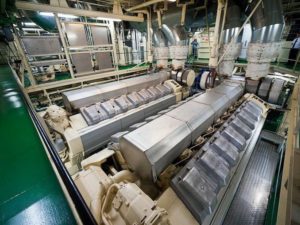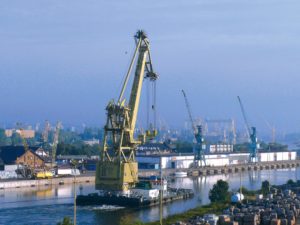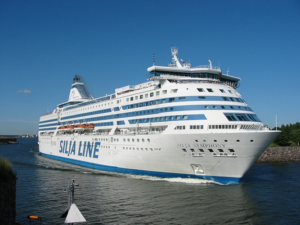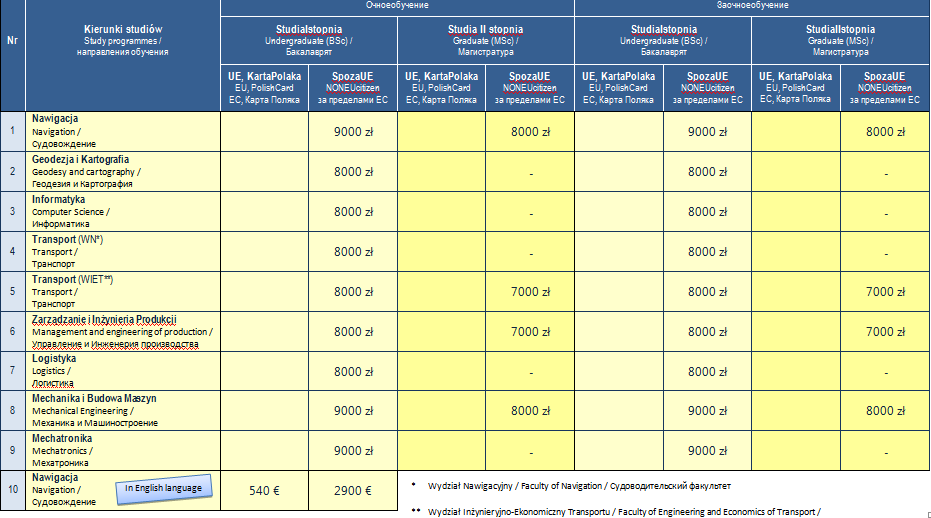Navigation Faculty
Candidates for admission are accepted to the direction, and the opportunity to choose a specialty of education will appear in the second year of study.
Day departments of the first degree (engineering)
DIRECTION: SHIPPING:
4 years of study in the field of:
– sea transport (TM)
– sea fishing (PM)
– marine traffic engineering (IRM)
– hydrography and navigation (PHiON)
– Maritime Rescue Service (RAT)
– Marine Information Systems (MSI)
– operation of floating units (offshore) (OFF)
– sea and river transport (TMiŚ)
– marine mining technology (GM)
DIRECTION: TRANSPORT:
3.5-year training in the field of:
– Maritime Transport Safety Engineering (IBTM)
– navigation technologies and systems (TiSN)
DIRECTION: GEODESY AND CARTOGRAPHY:
3.5-year training in the specialty:
– geoinformatics (G)
DIRECTION: INFORMATICS
3.5-year training in the specialty:
– Marine Informatics (IM)
Day department of the second degree (master’s)
DIRECTION: SHIPPING
1.5-year training in the specialty:
– sea transport (TM)
First degree correspondence (engineering)
DIRECTION: SHIPPING
4 years of study in the field of:
– sea transport (TM)
DIRECTION: GEODESY AND CARTOGRAPHY
3.5-year training in the specialty:
– geoinformatics
(G) DIRECTION: INFORMATICS
3.5-year training in the specialty:
– Marine Informatics (IM)
Correspondence offices of the second degree (master’s)
DIRECTION: SHIPPING
2-year specialties:
– sea transport (TM)
– sea transport (training in English) (TM)
What can you do as a graduate of the Navigation Faculty?
Destination navigation
The aim of education in the direction of navigation is to provide students with a wide basis of scientific knowledge and other branches of science that influence the elasticity of their career choices. The education program covers maritime and land professional practices as well as specialist courses. Graduates are prepared for the work of deck officers on sea and river vessels in enterprises associated with water transport.
They can be employed in services and merchant fleets with a high degree of specialization, the fishing fleet, on passenger ships, offshore-type vessels serving oil fields, on production and rigs, on modern specialist, hydrographic and research vessels. They can also work in land operational and technical services, maritime administration, classification organizations and in search and rescue services.
Direction of transport
Students in this field get knowledge and skills in the field of maritime transport, water transport safety, as well as modern navigation and traffic systems. Graduates’ places of work are organizations and enterprises that design, operate and organize transport and transport systems, as well as research, technical and regulatory institutions involved in the examination, consulting and regulation of laws.
Direction of geodesy and cartography
Graduates of the specialty geoinformatics acquire theoretical knowledge and practical skills to engage in engineering activities in the field of geodesy, cartography and territory observation systems, as well as the ability to apply modern geodetic, satellite, photogrammetric and remote sensing measurements. They are employed in enterprises that use geographic information.
The Direction Informatic
The main qualifications of a computer science graduate are skills in computer programming, design and management of informative systems, administration of databases and computer networks. Students will learn the rules of engineering programming at a level that allows for effective work in programming groups. Graduates are also prepared to start their own business activities and to establish themselves independently in the service sector.
.
Its task is to train highly qualified personnel who meet the current and future requirements of the sea transport, fishing and rescue fleet, as well as operational armature services. Sea transportations are and will be the cheapest means of transport and therefore for many years before you there will be a wide choice of workers in the global labor market.
Ship Mechanical Faculty
Candidates for admission are accepted for referral, and the choice of specialty education will appear in the second year of study
Day departments of the first degree (engineering)
DIRECTION: MECHANICS AND MECHANICAL ENGINEERING
4 years of study in the field
– эксплуатация судовых энергетических установок (ESO)
Direction:
– power plants with piston engines
– turbojet engines
– operation of tankers
– operation of vessels for the transport of chemical goods
– operation of refrigerated vessels
– operation of gas carriers
– computer control systems for ship power plants
– ship electric power industry and control systems
– operation and maintenance of ship electric power installations (EOUNiE)
– diagnostics and repairs of machines and ship installations (DiRMiUO)
3.5 year study in specialties:
– diagnostics and repair of wind power plants (DiRSW)
– environmental protection in the operation of fleet and ports (OŚwEFiP)
DIRECTION: MECHATRONICS
4 years of study in the field of:
– ship electrics (EO)
3.5 year study in specialties:
– energy systems mechatronics (MSE)
Day departments of the second degree (master’s)
DIRECTION: MECHANICS AND MECHANICAL ENGINEERING
1.5 year training in specialties:
– device and operation of marine energy systems; (BiEMSE)
– computer aide Marine engineering training in English; held together with Fachhochschule Flensburg (Germany)
First degree correspondence (engineering)
DIRECTION: MECHANICS AND MECHANICAL ENGINEERING
4 years of study in the field
– operation of ship power plants (ESO)
Directions of diplomas:
– ship power plants with piston engines
– turbojet engines
– operation of tankers
– operation of vessels for the transport of chemical goods
– operation of refrigerated vessels
– operation of gas carriers
– computer control systems for ship power plants
– ship electric power industry and control systems
4 years of training in the field:
– environmental protection in the operation of the fleet and ports (OŚwEFiP)
DIRECTION: MECHATRONICS
4 years of training in the field:
– ship electrics (EO)
– energy systems mechatronics (MSE)
correspondence offices of the second degree (master’s)
DIRECTION: MECHANICS AND MECHANICAL ENGINEERING
4 years of training in the field:
– device and operation of marine energy systems (BiEMSE)
What can you do as a graduate of the Faculty of Mechanics?
Direction of mechanics and engineering
A graduate specializing in the operation of shipboard power plants, after getting a diploma of an officer of the mechanic, can serve as an officer in a marine crew, work at repair yards and in traffic monitoring departments of such enterprises as power plants, pulp and paper mills, steel mills, ports, and sewage treatment plants water pumping stations.
A graduate of the specialty diagnostics and repairs of machinery and ship installations after getting a diploma of a mechanic officer can serve as an officer in a marine crew, work at shipyards and repair factories, power plants, pulp and paper mills, steel mills, ports, sewage treatment plants, pumping stations. stations, as well as specialist diagnostics. Graduate specialty diagnostics and repair of wind turbines has the knowledge necessary to understand and solve problems in the field of design, production and operation of machines. He can be employed in power generation, transmission and distribution plants, as well as in enterprises related to renewable energy, supervision of offshore and onshore wind power plants, electrical equipment manufacturing plants, power plants and thermal power plants, companies engaged in the production of supporting structures, equipment, appliances and heating systems.
A graduate of the specialty of operation and maintenance of shipboard electrical power installations, after obtaining a diploma of a mechanic officer, can perform the function of a mechanic officer on a ship, in technical supervision services of shipowners, in services of classification societies, in technical supervision services and enterprises related to the energy industry.
A graduate of the environmental protection specialty in fleet and port operations may be employed in research laboratories, institutions responsible for protecting the environment at various levels of state administration, in shipowning companies, shipyards, ports and industrial enterprises. A graduate of the specialty device and operation of marine energy systems receives a specialized education that meets the requirements of the modern fleet and engineering. He is prepared for work in research and design organizations, for managing and developing production at machine-building plants, and related enterprises.
Direction mechatronics
Graduates of the specialty Mechatronics energy systems are prepared to work as employees of shipbuilding and repair yards, in the repair services of industrial enterprises, in the technical supervision services of enterprises, in the services of classification societies, in technological, design and construction organizations related to machine building and shipbuilding, and in subdivisions performing technical diagnostics and servicing of machines and devices, including mechatronic systems.
 It’s task is training for the maintenance and servicing of ship power plants, as well as the repair of mechanical and electrical equipment. As a graduate of the Faculty of Mechanical Engineering, you will become a valuable worker as an Officer Mechanic, a specialist in the technical control services of valves and production facilities. In the world labor market, there is an increase in demand for technical specialists of engineers who are ready to work in the most difficult conditions.
It’s task is training for the maintenance and servicing of ship power plants, as well as the repair of mechanical and electrical equipment. As a graduate of the Faculty of Mechanical Engineering, you will become a valuable worker as an Officer Mechanic, a specialist in the technical control services of valves and production facilities. In the world labor market, there is an increase in demand for technical specialists of engineers who are ready to work in the most difficult conditions.
Faculty of transport
Candidates for admission are accepted for referral, and the choice of specialty education will appear in the second year of study
Day departments of the first degree (engineering)
DIRECTION: TRANSPORT
3.5 year study in specialties:
– transport system management in Europe (ZSTwE)
– operation of ports and navy (EPiFM)
– river transport (ŻŚ)
– integrated transport logistics (LTZ)
– transport insurance (UT)
– environmental management (E)
DIRECTION: LOGISTICS
3.5 year study in specialties:
– logistics of enterprises (LP)
– logistics and management in the European transport system (LiZwEST)
– Informatics in Logistics (IwL)
DIRECTION: PRODUCT MANAGEMENT AND ENGINEERING
3.5 year study in specialties:
– quality management of products and services (ZJPiU)
– management of innovations in products and services (ZiWPiU)
– security systems in products and services (SBwPiU)
– product information management systems (ISZP)
– management of industrial energy systems (ZPSE)
Day department of the second degree (master’s)
DIRECTION: PRODUCT MANAGEMENT AND ENGINEERING
1.5 year training in specialties:
– logistics and management in the European transport system (LiZwEST)
– Maritime Management
– training is conducted in English
DIRECTION: TRANSPORT
1.5 year training in the specialty:
– integrated transport systems (STZ)
First degree correspondence (engineering)
DIRECTION: TRANSPORT
3.5 year study in specialties:
– transport system management in Europe (ZSTwE)
– river transport (ŻŚ)
– integrated transport logistics (LTZ)
– transport insurance (UT) – environmental (E)
DIRECTION: LOGISTICS
3.5 year study in specialties:
– logistics of enterprises (LP) (13) I kolumna od lewej
– logistics and management in the European transport system (LiZwEST)
– Informatics in Logistics (IwL)
DIRECTION: PRODUCT MANAGEMENT AND ENGINEERING
3.5 year study in specialties:
– quality management of products and services (ZJPiU)
– management of innovations in products and services (ZiWPiU)
– security systems in products and services (SBwPiU)
– product information management systems (ISZP)
– management of industrial energy systems (ZPSE)
Correspondence offices of the second degree (master’s)
DIRECTION: TRANSPORT
1.5 year training in the specialty:
– integrated transport systems (STZ)
DIRECTION: PRODUCT MANAGEMENT AND ENGINEERING
1.5 year training in the specialty:
– logistics and management in the European transport system (LiZwEST)
What can you do as a graduate of the Faculty of Engineering and Transport?
Direction of product management and engineering
A graduate in management and engineering of products is prepared to perform managerial and executive functions at production and service enterprises of the TSL sector (transport, freight forwarding, logistics), with particular consideration of marine enterprises).
He has the ability to determine optimal strategic and operational goals, as well as the effective organization, coordination and control of certain production and service tasks when using modern information technologies. It is prepared for the management of logistics processes in the European transport system and the management of integrated transport. He has knowledge of entrepreneurship, the legal rules for conducting business, the ethics of management and the social responsibility of enterprises in the global economy. He uses knowledge from the field of management and engineering of products obtained in scientific laboratories equipped with appropriate computer programs, as well as on domestic and foreign internships. Fluently uses professional English. It has the ability to acquire language certificates.
Direction of transport
– traffic engineering,
– vehicle engineering,
– analysis of transport systems,
– management of operational processes,
– transport logistics.
They are specialists in the field of modern cargo transportation, operation of integrated transport terminals and logistics centers, as well as the organization of the management of the transport chain “house-house”. In professional work, they can use information technology. They are prepared for work in senior positions in the operational and design and engineering departments of transport, logistics and transport economics in institutions related to the general concept of transport. Freely use professional English. Have the ability to purchase language certificates.
Direction Logistics
A graduate in this field is professionally prepared to make the best decisions in the field of personnel, finance and information management in the enterprise.
He uses the skills of diagnostics, problem solving, monitoring of economic (including transport) processes, as well as the design of production and transport processes. It makes strategic and operational decisions in the field of the operation and development of the enterprise in a competitive environment and changing internal and external situations. He uses competencies that allow him to work in various domestic and international enterprises, as well as in his own firms (especially in enterprises from the TSL industry). He can be employed as a logistics specialist in an enterprise, a TSL field operator, a designer and consultant in logistics, transport and transport economics, an expert in logistics in economic and administrative departments. He is proficient in foreign languages, especially English, knows logistical and transport terminology, and also knows how to use information tools in the logistics management of an enterprise.
Its task is the training of management supervisory personnel, as well as those involved in the provision and forwarding (delivery). These skills are necessary when conducting each activity. A modern and enterprising person who wants to occupy a high position in a firm must possess the knowledge acquired at this faculty.
supervisory personnel, as well as those involved in the provision and forwarding (delivery). These skills are necessary when conducting each activity. A modern and enterprising person who wants to occupy a high position in a firm must possess the knowledge acquired at this faculty.
Graduates of the Maritime Academy are responsible people who speak good English and have modern technical knowledge.
Cost of education:
The cost of education for Ukrainians who do not have Polish roots: all “sea” specialties – 9000 zł / year (2100 euro / year), not “sea” specialties – 8000 zł / year (1900 euro / year.)


 Русский
Русский Українська
Українська
